|
|
|
Sort Order |
|
|
|
Items / Page
|
|
|
|
|
|
|
| Srl | Item |
| 1 |
ID:
101882
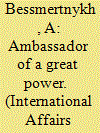

|
|
|
|
|
| Publication |
2010.
|
| Summary/Abstract |
THE TRAGIC 20th CENTURY, which was mixing up ideologies, breaking up socioeconomic systems, unleashing global wars and then keeping the world almost continuously in a state of tense instability, at the same time gave rise to the special need for skillful, sophisticated and strong diplomacy. This effective foreign policy tool was being honed for decades and increasingly used by our country for the protection of its security and peaceful development.
|
|
|
|
|
|
|
|
|
|
|
|
|
|
|
|
| 2 |
ID:
107704
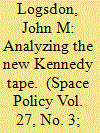

|
|
|
| 3 |
ID:
152003
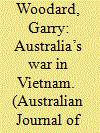

|
|
|
|
|
| Summary/Abstract |
Australia’s commitment in Vietnam can be interpreted as a small ally drawing its superpower partner into war for its own ends. Two studies by eminent Australian authors throw light on the role of human agency, and in so doing bring Australian historiography of the war closer to the trend in the United States. Peter Edwards’s history just about describes Vietnam as ‘Menzies War’. However, he finds no new sources on Menzies’s mindset, and diminishes the roles of his foreign ministers, Garfield Barwick and Paul Hasluck. The late Geoffrey Bolton’s intimate biography of Hasluck shows him as an active minister and also that his private papers are thin on Vietnam, the part of his distinguished career on which he never wrote. The Cabinet meeting of 17 December 1964 reveals much more about Australian decision-making on going to war than can be gleaned from Edwards’s cursory treatment and Bolton’s second-hand account. Barwick’s different approach, and even Hasluck’s last-minute caution, show Australia had a choice. Barwick, if he had remained Foreign Minister, might have kept Australia out of the Vietnam war, so freeing it to continue to play a leading regional political role.
|
|
|
|
|
|
|
|
|
|
|
|
|
|
|
|
| 4 |
ID:
095530
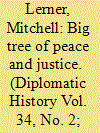

|
|
|
|
|
| Publication |
2010.
|
| Summary/Abstract |
During his three years as John F. Kennedy's vice president, Lyndon Johnson made eleven trips to thirty-three countries, covering over 120,000 miles, more than any of his predecessors. Yet, few contemporaries, including the journalist who described Johnson as someone "who chases around continents in search of the duties of his office," considered these trips significant.1 Some even suspected that he was sent away so often simply because JFK wanted to keep the overbearing Texan occupied and hence away from him; Kennedy, one West Virginia newspaper wrote, had recently sent him overseas twice in order "to keep his Vice President busy."2 Most policymakers also saw these missions as unimportant. Deputy Undersecretary of State William Crockett, who sometimes accompanied Johnson, recalled that "on the trips he took as Vice-President, there wasn't much policy to discuss; they were essentially representational functions."3 Such sentiments were both common and unsurprising, as Americans everywhere recognized that Johnson played virtually no role in the major policy decisions of the administration. In 1963, Time Magazine noted that the former Senate leader was now "lost in the vice-presidency," and a Newsweek article entitled "LBJ: Who's That?" described its subject as "as powerless as a freshman Senator and almost as obscure."4 A year earlier, Newsweek had noted of the former leader that "Lyndon Johnson is in the position of an abdicated king, and kings who abdicate are monarchs without power."5 His nonexistence seemed confirmed by the television show Candid Camera, which asked random people, "Who is Lyndon Johnson?" Answers flew: a baseball player, an astronaut, but no one (at least, no one who was televised) identified him as the vice president of theUnited States. "No, I don't know him," explained one man. "I'm from New Jersey.
|
|
|
|
|
|
|
|
|
|
|
|
|
|
|
|
| 5 |
ID:
110292
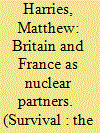

|
|
|
|
|
| Publication |
2012.
|
| Summary/Abstract |
In November 2010, as part of a broad-ranging bilateral defence agreement, the United Kingdom and France signed a treaty providing for limited cooperation on nuclear weapons. Modest in scope, and the product in immediate terms of economic pressure, the nuclear treaty's main substantive provision is for the joint construction of radiographic-hydrodynamic facilities. Beneath the surface of this treaty, however, lies a story of significant strategic shifts, and there are intriguing possibilities for future collaboration between the UK and France, and perhaps for trilateral cooperation involving the United States.
The potential for UK-French collaboration spans the spectrum of nuclear-weapons issues, from technology to policy, and perhaps to operational matters. These possibilities are sensitive, not only because they run into the everyday difficulties of political-military relations between the countries, but also for their relevance to two current debates: the ongoing battle over renewing the UK's fleet of strategic nuclear submarines, and international demands for multilateral nuclear disarmament.
|
|
|
|
|
|
|
|
|
|
|
|
|
|
|
|
| 6 |
ID:
038695
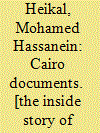

|
|
|
|
|
| Publication |
New York, Doubleday and company, 1973.
|
| Description |
xxxv, 360p.Hbk
|
| Standard Number |
0385064470
|
|
|
|
|
|
|
|
|
|
|
|
Copies: C:1/I:0,R:0,Q:0
Circulation
| Accession# | Call# | Current Location | Status | Policy | Location |
| 012229 | 923.162/HEI 012229 | Main | On Shelf | General | |
|
|
|
|
| 7 |
ID:
139164
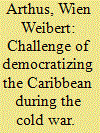

|
|
|
|
|
| Summary/Abstract |
This article examines the course of U.S.–Caribbean relations during the Kennedy years, considering Haiti as a case study. During the first year of Kennedy’s presidency, the U.S. policy toward Haiti was ambivalent. Duvalier’s regime displeased Kennedy since the beginning. Nevertheless, fear of Communism caused him to take a laissez-faire approach to the Haitian situation. The Haitian dictator was a Western ally in the Cold War, and U.S. intelligence believed that Castro or Haitian Communists could benefit from his removal. Starting in 1962, Kennedy did not hide his revulsion for the Haitian dictator. Cold War consideration, again, motivated his shift to an open and hostile position toward Duvalier. U.S. officials were afraid that Duvalier’s dictatorship would provoke a Communist revolution in Haiti. Factors that had been an asset to Duvalier led to his undoing. Kennedy, therefore, was resolute to bring a political change in Haiti and decided the best means would be Duvalier’s demise. However, U.S. limited economic sanction and incomplete military actions were insufficient to bend Duvalier. This study helps verify the reference of “the most dangerous area in the world” attributed to the Caribbean and Latin America during the Cold War era.
|
|
|
|
|
|
|
|
|
|
|
|
|
|
|
|
| 8 |
ID:
131631


|
|
|
| 9 |
ID:
111018
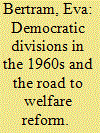

|
|
|
|
|
| Publication |
2011.
|
| Summary/Abstract |
Eva Bertram analyzes the effects of welfare reform initiatives undertaken by the Kennedy and Johnson administrations. She argues that liberalizing reforms of the 1960s created opportunities for conservative Democratic lawmakers to seize the policy agenda, laying the groundwork for a turn toward workfare that would culminate in the 1990s.
|
|
|
|
|
|
|
|
|
|
|
|
|
|
|
|
| 10 |
ID:
110450
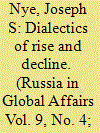

|
|
|
|
|
| Publication |
2011.
|
| Summary/Abstract |
In a world of new transnational challenges created by non-state actors the United States and Russia have much to gain from working together to cope with these new challenges. In short, the U.S. has more to gain from partnership with a strong reformed Russia rather than a weak declining Russia.
|
|
|
|
|
|
|
|
|
|
|
|
|
|
|
|
| 11 |
ID:
117431
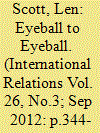

|
|
|
|
|
| Publication |
2012.
|
| Summary/Abstract |
The role of American intelligence in the Cuban missile crisis is crucial to understand perceptions and judgements of key actors in October 1962. Dino Brugioni's Eyeball to Eyeball provides a detailed 'insider's' account that combines memoir and history. It focuses on the role of aerial intelligence, which was vital to how the crisis was managed in Washington. Brugioni's account also provides a representation of events that explores both military/operational aspects and political decision-making in Washington, most importantly that of President John F. Kennedy. Brugioni argues that it was a victory for Kennedy and for America. Twenty years of scholarship and revelation has challenged this conclusion, which this article examines. Likewise, the idea that the crisis marked a notable success for the Central Intelligence Agency (CIA) is revisited in the light of new information and assessments.
|
|
|
|
|
|
|
|
|
|
|
|
|
|
|
|
| 12 |
ID:
099986
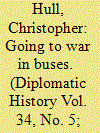

|
|
|
|
|
| Publication |
2010.
|
| Summary/Abstract |
The sale of buses by the Leyland Motor Company to Cuba proved contentious, not only in the realm of Anglo-American relations, but also in the domestic sphere of a behind the scenes inter-departmental disagreement within the British government. This is because the bus exports pitted political against economic interests at the height of the Cold War and in the midst of a British export drive. As Her Majesty's Government readily recognized, Washington was particularly sensitive over any issue related to Cuba, which by 1963 was firmly in the communist orbit of the Soviet bloc and which the United States was determined to isolate economically through the application of a trade blockade.
The decision to approve the sales came at the end of the Macmillan and Kennedy administrations, and clouded the short-lived partnership of Prime Minister Alec Douglas-Home and President Lyndon B. Johnson. The bus exports became an election issue in the campaigns of both leaders in 1964, assuming a political significance that belied the buses' seemingly innocuous function and outward appearance.
|
|
|
|
|
|
|
|
|
|
|
|
|
|
|
|
| 13 |
ID:
100480
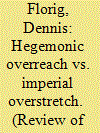

|
|
|
|
|
| Publication |
2010.
|
| Summary/Abstract |
The concept of hegemonic overreach proposes a revision of Kennedy's notion of imperial overstretch that puts more emphasis on policy choices of hegemonic states. Previous long-cycle theories of hegemonic breakdown have focused on the contradiction between the hegemon's growing military-political commitments and its slipping economic capability relative to rising challenger states. Another key contradiction in US foreign policy is between the imperatives of hegemony and the ideology of messianic mission developed long before the US stepped up to its current global role. Hegemonic overreach, driven by this sense of messianic mission, is a major cause of failure in US foreign policy.
|
|
|
|
|
|
|
|
|
|
|
|
|
|
|
|
| 14 |
ID:
066173
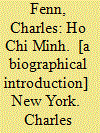

|
|
|
|
|
| Publication |
New York, Charles Scribner's sons, 1973.
|
| Description |
144p.Hbk
|
| Standard Number |
684133504
|
|
|
|
|
|
|
|
|
|
|
|
Copies: C:1/I:0,R:0,Q:0
Circulation
| Accession# | Call# | Current Location | Status | Policy | Location |
| 013190 | 923.1597/FEN 013190 | Main | On Shelf | General | |
|
|
|
|
| 15 |
ID:
097833
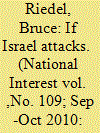

|
|
|
|
|
| Publication |
2010.
|
| Summary/Abstract |
IN A secret special national intelligence estimate (SNIE) in 1960, the American intelligence community concluded that "possession of a nuclear weapon capability . . . would clearly give Israel a greater sense of security, self-confidence, and assertiveness." For almost half a century since, Israel has possessed a nuclear-weapons monopoly in the Middle East, a monopoly it has fought hard to preserve.
|
|
|
|
|
|
|
|
|
|
|
|
|
|
|
|
| 16 |
ID:
122911
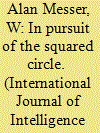

|
|
|
|
|
| Publication |
2013.
|
| Summary/Abstract |
The controversial case of KGB defector Yuriy Nosenko has centered on the contention that he was a double agent for the KGB. Heretofore, compelling evidence suggesting that he was bad has contended with the compelling argument that he must be good because the KGB would not be so foolish as to orchestrate a double agent case in this manner. A third theory seeks to square the circle with a conclusion that is roughly compatible with both arguments. In the process, the argument demonstrates how truly professional operational counterintelligence ought to be conducted.
|
|
|
|
|
|
|
|
|
|
|
|
|
|
|
|
| 17 |
ID:
111107
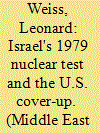

|
|
|
| 18 |
ID:
098665
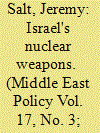

|
|
|
| 19 |
ID:
095528
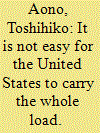

|
|
|
|
|
| Publication |
2010.
|
| Summary/Abstract |
This article reexamines Anglo-American relations in light of the Berlin crisis during the Kennedy years. The Berlin crisis has been extensively studied, especially after the 1990s when newly declassified materials shed new light on the incident. Using archival sources of the former Soviet bloc countries, recent works have closely explored Khrushchev's motivation for provoking such a conflict in Central Europe, while revealing the dynamics of alliance politics between the Soviet Union and the German Democratic Republic (GDR).1 On the Western side, while focusing mainly on American and West German decision making, many studies point out that the major Western powers-the United States, Britain, France, and the Federal Republic of Germany (FRG)-disagreed on how to handle the Berlin crisis.
|
|
|
|
|
|
|
|
|
|
|
|
|
|
|
|
| 20 |
ID:
096602
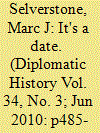

|
|
|
|
|
|
|
|